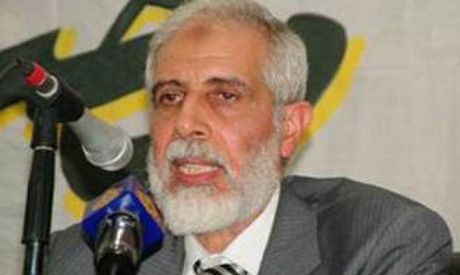 As the Muslim Brotherhood began to legally challenge a British government report about the group's connections with radicalism which was released this week, the group's branch in Egypt seems to be suffering from an internal crisis which was largely played out via social media.
As the Muslim Brotherhood began to legally challenge a British government report about the group's connections with radicalism which was released this week, the group's branch in Egypt seems to be suffering from an internal crisis which was largely played out via social media.
The crisis began on Monday when the Muslim Brotherhood's deputy supreme guide, Mahmoud Ezzat, issued a final decision backed by the Brotherhood's London office to dismiss Mohamed Montasser from his position as official spokesperson of the group in Egypt for defying the group's orders and issuing statements expressing his own views.
Ezzat, whose whereabouts are unknown, also issued a decision appointing 55-year-old Talaat Fahmy as the new spokesperson for the banned group. Fahmy is believed to be outside the country.
Montasser was appointed official spokesperson of the Muslim Brotherhood in January 2015.
Following Ezzat's decision to dismiss Montasser, not less than 16 Brotherhood administrative offices, including the offices of Cairo, Giza , Fayoum, Qaloubiya and Alexandria declared they rejected the decision in a statement on Facebook, which condemned what they described as interference by the Brotherhood London branch in their internal affairs.
The Alexandria administrative office also announced on its official Facebook page on Monday that it had suspended Talaat Fahmy's membership in the Brotherhood, and referred him to investigation.
The high administrative committee of the Brotherhood in Cairo also issued a statement on the Muslim Brotherhood's official Facebook page, announcing that it did not issue a decision regarding the dismissal of Montasser from his post as official spokesperson.
The statement added that the only party involved in issuing decisions in Egypt was the high committee, a slap in the face of older generations of leading figures such as Mahmoud Ezzat.
On his official Facebook page, Montasser issued a message to those he called "the revolutionary youth and free patriots" to start implementing their plan to save their "revolution" planned in January by "bringing down the military."
The crisis moved from social media to the mainstream media when Montasser appeared on Qatar-based Al-Jazeera Mubashar television channel Monday evening, where he was described as the only official Brotherhood spokesperson.
At the same moment Talaat Fahmy appeared on the London-based Al-Hewar channel and was also described as the group's official spokesman, speaking about the Brotherhood's plans for the upcoming 25 January Revolution anniversary, and about the group's commitment to peacefulness.
As debates between Brotherhood members and supporters continue online, former MP and veteran leading figure Gamal Heshmat denied on his personal Facebook account that there was any division in the Muslim Brotherhood, saying instead that there was "differentiation in views among its ranks."
Yet in the same post, Heshmat said there was no place for anyone who rebelled against the leadership of the Muslim Brotherhood in Egypt or who mocked the older members of the group.
On Tuesday, deputy guide Mahmoud Hussein's team issued statements on a newly launched website with the address “ikhwan.site" defending the decisions to dismiss Montassar.
On Wednesday, the official website of the Muslim Brotherhood in Arabic, Ikhwan Online, issued a statement from the “Egyptian Muslim Brotherhood office abroad” declaring its full support for the high administrative council in Cairo.
The statement also announced a number of decisions, including the establishment of a fact-finding committee to investigate the practices of Hussein and others concerning their handling of "the Egyptian crisis file.”
The statement also announced that the investigation would include the practices of the Brotherhood office in London.
This was not the first divisive debate the group, founded in Ismailia in 1928, has gone through in recent months. Earlier this year there was a debate between the group's old guard and members of the younger generation, led by Mohamed Montasser, around the issue of whether to adhere to an official policy eschewing violent tactics.
A security crackdown since July 2013 has led to the arrest of thousands of the group's members, including the supreme guide, Mohamed Badie, and much of the group's leadership. Many of the imprisoned leading figures are facing death sentences or life in prison.
The Brotherhood was officially designated a terrorist organisation in Egypt by the government in December 2013.
Most of the remaining leading members of the Egyptian Brotherhood have fled to other countries, including the UK, Turkey, Qatar and Malaysia.



